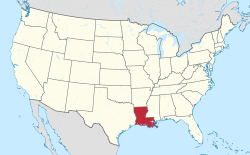Moreauville, Louisiana | |
|---|---|
Village | |
 Location of Moreauville in Avoyelles Parish, Louisiana. | |
 Location of Louisiana in the United States | |
| Coordinates: 31°02′09″N91°59′35″W / 31.03583°N 91.99306°W [1] | |
| Country | United States |
| State | Louisiana |
| Parish | Avoyelles |
| Area | |
• Total | 3.03 sq mi (7.84 km2) |
| • Land | 3.03 sq mi (7.84 km2) |
| • Water | 0.00 sq mi (0.00 km2) |
| Elevation | 56 ft (17 m) |
| Population (2020) | |
• Total | 984 |
| • Density | 325.07/sq mi (125.53/km2) |
| Time zone | UTC-6 (CST) |
| • Summer (DST) | UTC-5 (CDT) |
| Area code | 318 |
| FIPS code | 22-51970 |
| GNIS feature ID | 2407505 [1] |
| Website | www |
Moreauville is a village in Avoyelles Parish, Louisiana, United States. The population was 929 at the 2010 census. [3]
